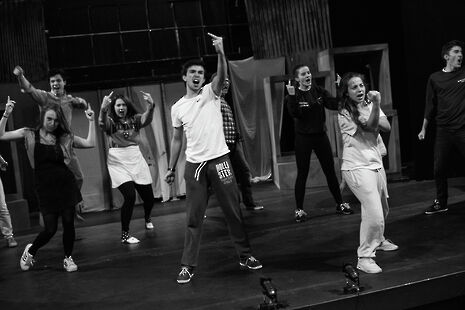Review: Spring Awakening
Our reviewer found themselves on an emotional ride

I've always loved musicals, and I've always loved Spring Awakening, so perhaps it is fair to say that I was expecting a lot out of tonight's production. And while I was delighted by some aspects of it, and generally impressed by the slickness of the direction, I had my reservations about the production.
The immediate impression made by Jack Parkham's gorgeous, intricate set and Bethany Craik's beautiful lighting was immersive. The decision to keep the original production's traditional setting, without pushing further the boundaries of the generational divide introduced by the chasm between rock music and late 19th Germany, was slightly disappointing however, as Cambridge is known for bothering the status quo.
Individual actors deserve congratulations; Ben Cisneros as Melchior, half of the main starring couple, and Amy Carmichael as Martha especially impressed me. Cisneros carried the arrogance and vulnerability of the intelligent adolescent with effortless poise, while Carmichael's heartbreaking solo brought me nearly to tears. In terms of comedy, Megan Gilbert and Robin Franklin form a fantastic duo with amazing comedic timing, and their solo efforts are just as engaging. The company was weaker in group numbers, with choreography often seeming stilted, but the general effect was one of coherence and harmony.
Spring Awakening's atmosphere of frustration with authority leading to ultimate hope is especially relevant for a student audience like Cambridge's, and there is no doubt that the themes struck a chord with many spectators as it got right the consuming awkwardness and fledgling physicality of adolescent desires, as well as the ways in which sex often intersects with violence.
Spring Awakening is essentially a tragic story, which seems to underline the risks of insufficient sex education and the failure of inter-generational communication. The tragic deaths which punctuate the story cannot fail to affect the audience, yet the ultimate message of the musical is one of survival. The story will go on. What bothered me in this production, however, was the lack of emphasis on the question of consent. The original production had Wendla and Melchior's first encounter as rape, and while this production does not present it quite this way, Wendla's basic lack of understanding of the act still troubles me. In the same way, the lack of resolution to Martha's abuse by her father is unsettling to say the least.
All in all, I enjoyed myself thoroughly, though I sometimes wished that Rebecca Vaa's directorial hand had been heavier and more critical. It was an emotional ride to say the least. As the company sings in the beautiful closing number "[a]ll shall know the wonder / Of purple summer…"
 Features / Should I stay or should I go? Cambridge students and alumni reflect on how their memories stay with them15 December 2025
Features / Should I stay or should I go? Cambridge students and alumni reflect on how their memories stay with them15 December 2025 News / Cambridge study finds students learn better with notes than AI13 December 2025
News / Cambridge study finds students learn better with notes than AI13 December 2025 News / Dons warn PM about Vet School closure16 December 2025
News / Dons warn PM about Vet School closure16 December 2025 News / News In Brief: Michaelmas marriages, monogamous mammals, and messaging manipulation15 December 2025
News / News In Brief: Michaelmas marriages, monogamous mammals, and messaging manipulation15 December 2025 Comment / The magic of an eight-week term15 December 2025
Comment / The magic of an eight-week term15 December 2025








